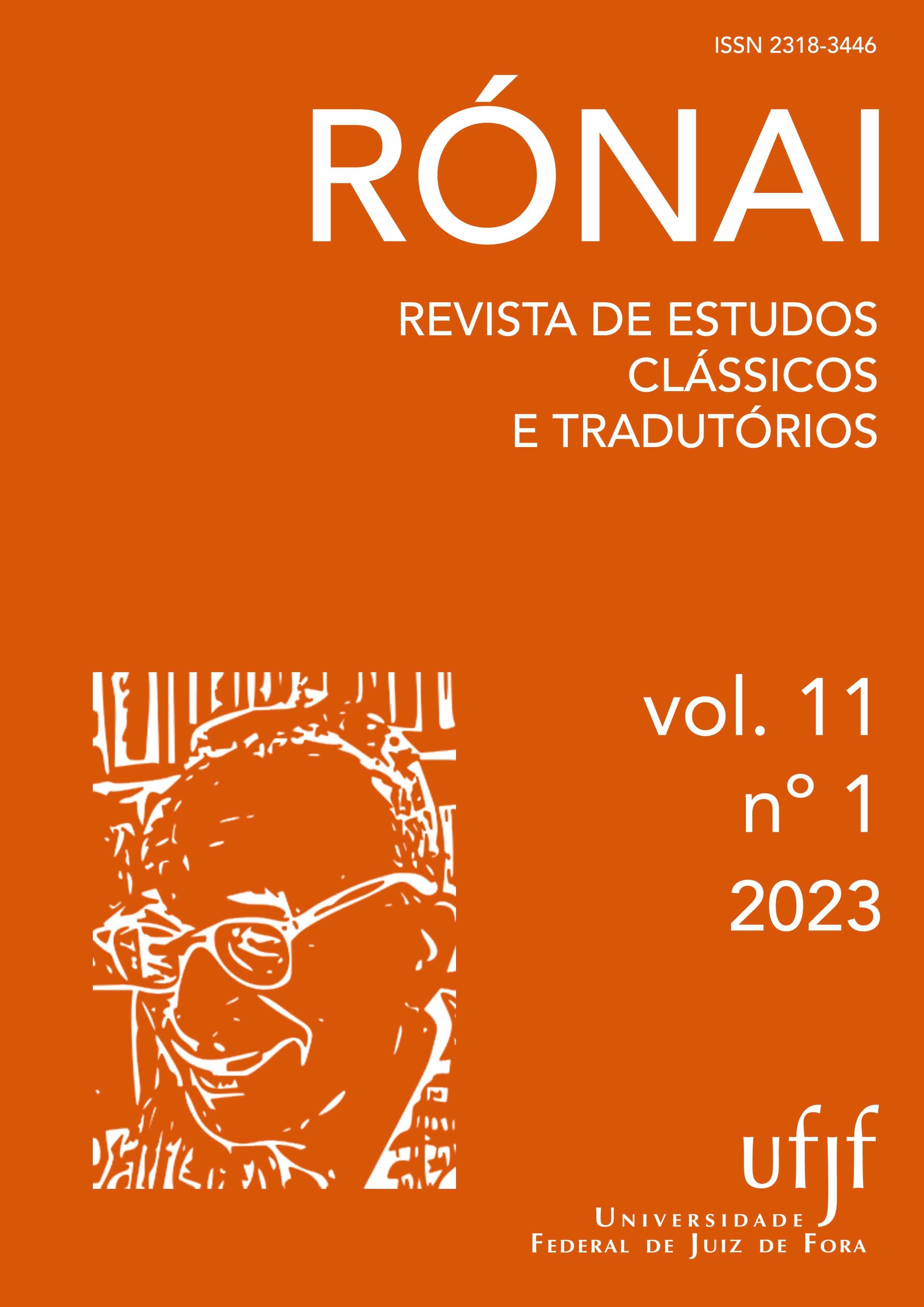Acteon’s death (Ovid, Metamorphoses, 3. 143-252)
DOI:
https://doi.org/10.34019/2318-3446.2023.v11.40230Keywords:
poetic translation, dactylic hexameter, Portuguese dodecasyllable, Ovid, MetamorphosesAbstract
I present the translation of the 109 dactylic hexameters of the episode about the death of Actaeon, torn apart by his dogs, in an equal number of verses, a characteristic that I call “isosticheia”. For this purpose, given that the hexameter is a long verse and of variable tempo according to the caesuras, I used the dodecasyllable, which is the second longest of the most common verses in the Portuguese language and endowed with great variety, since it can have three tempos: 1) with main stress on the sixth syllable with synalepha, that is, the Alexandrian verse; 2) with main stress on the sixth syllable without synalepha; 3) with accents rarely incident on the fourth and eighth syllable. The episode, unlike what usually occurs in the Metamorphoses, is not etiological, and not being so contributes to it being pathetic, a condition that in this case is corroborated by the strangeness caused by the long and ostensible series of the Greek names of the dogs. The translation of these names is not obvious, but it is necessary to decide: to keep them in their Portuguese form, as I did (“Melampo” for Melampus, for instance), or in fact to translate them into Portuguese (“Negras-Patas” / “Black-Paws”, for Melampus comes from μέλας, “black”, + πούς, “paw”), as I exemplify with the translation that Jaa Torrano made of the names of the Muses in Hesiod’s Theogony? The decision, in turn, presupposes an analysis of the poem and theoretical reflection on the implication of each possibility.Downloads
References
AZEVEDO FILHO, L. A. de. A técnica do verso em português. Rio de Janeiro: Livraria Acadêmica, 1971.
CARVALHO, A. de. Tratado de versificação portuguesa. 4ª ed. Lisboa: Centro do Livro Brasileiro, 1981.
CHOCIAY, R. Teoria do verso. São Paulo: McGraw-Hill do Brasil, 1974.
LAFAYE, G. Ovide, Les metamorphoses. Tome I. Paris: Les Belles Lettres, 1928.
OLIVA NETO, J. A. 11 poemas de Propércio traduzidos com o verdadeiro dístico elegíaco de Péricles Eugênio da Silva Ramos. In: Oliva Neto, João Angelo (org.), Cadernos de literatura em tradução, São Paulo, v. 15, p. 151-184, 2015.
TARRANT, R. J. P. Ovidi Nasonis Metamorphoses. Oxford: University Press, 2004.
UREÑA PRIETO, M. H. de T. C.; UREÑA PRIETO, J. M. de T. C.; PENA, A. do N. Índices de nomes próprios gregos e latinos. Lisboa: Fundação Calouste Gulbenkian / Junta Nacional de Investigação Científica e Tecnológica, 1995.
Downloads
Published
How to Cite
Issue
Section
License
Copyright (c) 2023 João Angelo Oliva Neto

This work is licensed under a Creative Commons Attribution 4.0 International License.
Copyright
The authors of the published contributions agree with the following items:
1. The authors keep the copyright and convey to the journal the right of first publication, the work being licensed under a Creative Commons Attribution License 4.0 International.
2. The authors are allowed and stimulated to publicize and distribute their work online after the publication in the journal, recognizing first publication in this journal.
3. The authors of the approved works authorize the journal to distribute their content, after publication, for reproduction in content indexes, virtual libraries and similars.
For more information about Creative Commons Attribution License 4.0 International, please, go to: https://creativecommons.org/licenses/by/4.0/deed.en
Editorial exemption
The authors of the published contributions are entirely and exclusively responsible for their contents. Its content does not represent an official position of Rónai - Revista de Estudos Clássicos e Tradutórios neither of Faculdade de Letras da Universidade Federal de Juiz de Fora or their partner institutions.



